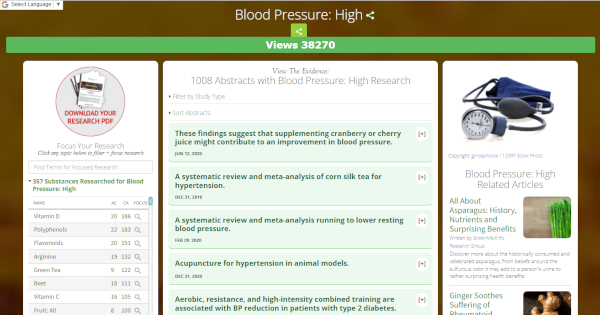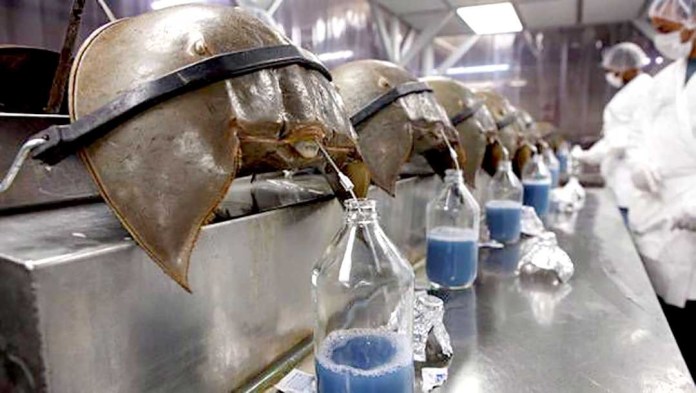By Dr. Diane Fulton
If high blood pressure plagues you, eating certain whole foods may be an effective way to help manage your condition
High blood pressure currently affects 26% of the world’s population — 972 million people — and changing what you eat can significantly improve your blood pressure.[i] From relaxing with green tea and using garlic to spice up your cooking to adding more fruits and veggies like kiwi, pomegranate, orange, grapefruits, beets, broccoli and carrots to your diet, your blood pressure can oftentimes be lowered naturally.
Eating flavonoid-packed cocoa or dark chocolate is also a way to decrease your risk for high blood pressure and cardiovascular diseases. Here’s a look at some of these healthy dietary additions in detail.
Green Tea
Due to its antioxidant and anti-inflammatory properties, green tea is a whole food that can fight cardiovascular diseases, Type 2 diabetes, cancers, neurodegenerative diseases, high blood pressure, obesity and imbalanced cholesterol.[ii]
Green tea’s ability to lower blood pressure derives from its most abundant polyphenol — compounds called catechins, which activate a voltage-gated potassium channel called KCNQ5 that helps with vasodilation (enhancing blood flow) by increasing muscle tone in the arteries and regulating important neurons.[iii]
In a meta-analysis of 11 studies with a total of 821 participants, green tea significantly improved cholesterol and blood pressure.[iv] Similarly, a review of 20 trials comprising 1,536 participants revealed a significant reduction in systolic blood pressure and significant improvements in lipid profiles that balanced cholesterol.[v]
In a study of 44 sedentary women with high blood pressure, subjects who consumed green tea and did resistance training twice a week for nine weeks had the highest improvements in mean and systolic blood pressure when compared to the placebo or each treatment alone.[vi]
Garlic
Garlic has had very positive results on lowering blood pressure, managing cholesterol levels and reducing risk for cardiovascular diseases and Type 2 diabetes.[vii],[viii]
In a systematic review of nine studies investigating the effects of garlic on lipid parameters and eight systematic reviews on blood pressure parameters, 75% or more of the reviews found garlic interventions significantly decreased total cholesterol levels, systolic blood pressure and diastolic blood pressure.[ix]
In another meta-analysis of 14 trials, garlic — particularly aged garlic extract — consistently reduced systolic blood pressure by 7 to 16 mmHg, diastolic blood pressure by 5 to 9 mmHg and total cholesterol by 7 to 30 milligrams (mg) per deciliter (dL).[x]
Fruits and Vegetables
Current research shows that eating more fruits and vegetables has a positive effect of lowering blood pressure as well as decreasing risk for cardiovascular and metabolic syndrome diseases.[xi],[xii],[xiii] The mechanisms by which fruits and vegetables are able to help manage blood pressure vary according to their potassium, flavonoid, polyphenol and fiber contents.[xiv]
In their analysis of three large longitudinal cohort studies of 187,453 nurses and health professionals, those who ate four or more servings of fruits and vegetables per week — as opposed to less than one serving per month — particularly broccoli, carrots, tofu or soybeans, raisins and apples, had lower risk of high blood pressure.[xv]
A study of 5,659 Chinese adults who were free of cardiovascular disease, cancer and high blood pressure in 2006 was compared to a follow-up analysis in 2011 resulting in 866 subjects with high blood pressure and fruit intake as the most significant factor associated with lower blood pressure.[xvi]
Research on four fruits shows their ability to control blood pressure — kiwis, pomegranate and two citrus fruits. Eating three kiwis per day for eight weeks in a study of 118 subjects with moderately elevated blood pressure was more significant in lowering blood pressure than eating an apple a day.[xvii]
Quantitative data synthesis from eight randomized trials showed significant reductions in both systolic and diastolic blood pressure with more than a 240 cubic centimeter (cc) dose per day of pomegranate juice.[xviii] In a study of 13 men with high blood pressure ages 39 to 68, 150 milliliters (ml) of pomegranate juice per day significantly reduced systolic blood pressure by 7% and diastolic blood pressure by 6%.[xix]
In a trial of 22 healthy patients ages 18 to 59 who drank 500 ml per day of orange juice from concentrate, both diastolic and systolic blood pressure decreased. Grapefruit juice, a good source of vitamin C, pectin fiber and antioxidants, also decreased both systolic and diastolic blood pressure in both healthy and high blood pressure subjects.[xx]
Beets
Recent studies have shown a variety of health benefits for red beetroot and its active compound betalain — blood pressure and lipid improving, antioxidative, anti-inflammatory, antidiabetic and anti-obesity effects.[xxi],[xxii],[xxiii]
In a systematic review of 22 studies including 650 beetroot juice and 598 control participants, both systolic and diastolic blood pressure were significantly lower in the beetroot group than in the control group. The mean difference of systolic blood pressure was larger between the beetroot juice-supplemented group and the control group when subjects drank beet juice for more than 14 days and at the higher dose of 500 ml per day.[xxiv]
Beetroot supplementation of 150 ml 2.25 hours before a treadmill test of 24 subjects revealed increased plasma nitrite concentrations and reduced diastolic blood pressure to a greater degree in older adults while systolic blood pressure was reduced in both older and younger adults.[xxv]
In a study of 47 middle-aged and older participants, those given beetroot juice containing 400 mg of nitrate for 60 days had the biggest 24-hour systolic blood pressure drop compared to the placebo group or the folic acid with beet group, and only the beet group showed a significant decrease in 24-hour diastolic blood pressure.[xxvi]
Cocoa/Chocolate
Flavonoid-rich chocolate — dark chocolate that is typically 70% or more cocoa content with less sugar and a bit of a bitter taste — is considered a superfood for its ability to lower blood pressure, protect your heart, prevent diabetes, decrease cognitive decline and fight oxidative stress.[xxvii],[xxviii]
Among 45,653 women, chocolate consumption was estimated from an extensive dietary questionnaire and 12,793 cases of high blood pressure were identified. Moderate consumption of 2.3 grams per day of plain chocolate was inversely associated with the risk of high blood pressure. However, chocolate/cocoa intake from desserts or sweet sources was tied to significantly increased blood pressure risk.[xxix]
In a meta-analysis of 42 studies including 1,297 participants, those who ate more than 50 mg per day of chocolate or cocoa showed higher prevention of cardiovascular disease with better insulin resistance, increased flow-mediated dilatation — which measures how well the arteries are doing — reductions in diastolic blood pressure and mean arterial pressure and marginally significant effects on cholesterol.[xxx]
In a systematic review of 16 studies researching chocolate, the results showed a protective effect of moderate consumption of chocolate on cardiovascular risk, especially for women.[xxxi] Dietary intake of chocolate and blood pressure were assessed at baseline in 19,357 participants ages 35 to 65 years who were free of myocardial infarction and stroke and not on high blood pressure medication.
A follow-up study eight years later reported 166 cases of myocardial infarction and 136 strokes. The highest chocolate group’s systolic blood pressure was 1.0 mmHg, and mean diastolic blood pressure 0.9 mmHg, lower compared with the bottom quartile of chocolate and higher cocoa intake was associated with lower cardiovascular disease risk.[xxxii]
Natural Foods That Lower Blood Pressure
Current research shows that whole foods added to your diet can help to control your blood pressure and keep you healthier. These protective foods include green tea, garlic, fruits, vegetables, beets and cocoa/chocolate. For more in-depth information, please see GreenMedInfo.com’s research on high blood pressure.
References [i] Medscape.com. Answers. What is the global prevalence of hypertension/high blood pressure? https://www.medscape.com/answers/241381-7614/what-is-the-global-prevalence-of-hypertension-high-blood-pressure [ii] Daniel Hinojosa-Nogueira, Sergio Pérez-Burillo, Silvia Pastoriza de la Cueva, José Ángel Rufián-Henares. Green and white teas as health-promoting foods. Food Funct. 2021 May 11 ;12(9):3799-3819. PMID: 33977999 [iii] Cellular Physiology & Biochemistry, KCNQ5 Potassium Channel Activation Underlies Vasodilation by Tea https://www.cellphysiolbiochem.com/Articles/000337/ [iv] Louise Hartley, Nadine Flowers, Jennifer Holmes, Aileen Clarke, Saverio Stranges, Lee Hooper, Karen Rees. Green and black tea for the primary prevention of cardiovascular disease. Cochrane Database Syst Rev. 2013 Jun 18(6):CD009934. Epub 2013 Jun 18. PMID: 23780706 [v] I Onakpoya, E Spencer, C Heneghan, M Thompson. The effect of green tea on blood pressure and lipid profile: a systematic review and meta-analysis of randomized clinical trials. Nutr Metab Cardiovasc Dis. 2014 Aug ;24(8):823-36. Epub 2014 Jan 31. PMID: 24675010 [vi] Behzad Taati, Hamid Arazi, Jalal Kheirkhah. Interaction effect of green tea consumption and resistance training on office and ambulatory cardiovascular parameters in women with high-normal/stage 1 hypertension. J Clin Hypertens (Greenwich). 2021 Jan 24. Epub 2021 Jan 24. PMID: 33491287 [vii] Jeffrey M Turner, Erica S Spatz. Nutritional Supplements for the Treatment of Hypertension: A Practical Guide for Clinicians. Curr Cardiol Rep. 2016 Dec ;18(12):126. PMID: 27796863 [viii] Ganiyu Oboh, Adedayo O Ademiluyi, Odunayo M Agunloye, Ayokunle Olubode Ademosun, Bolaji Grace Ogunsakin. Inhibitory Effect of Garlic, Purple Onion, and White Onion on Key Enzymes Linked with Type 2 Diabetes and Hypertension. J Diet Suppl. 2018 Mar 9:1-14. Epub 2018 Mar 9. PMID: 29522359 [ix] Lukas Schwingshackl, Benjamin Missbach, Georg Hoffmann. An umbrella review of garlic intake and risk of cardiovascular disease. Phytomedicine. 2015 Nov 14. Epub 2015 Nov 14. PMID: 26656227 [x] Ravi Varshney, Matthew J Budoff. Garlic and Heart Disease. J Nutr. 2016 Feb ;146(2):416S-21S. Epub 2016 Jan 13. PMID: 26764327 [xi] Yi Zhang, Dian-Zhong Zhang. Associations of vegetable and fruit consumption with metabolic syndrome. A meta-analysis of observational studies. Public Health Nutr. 2018 06 ;21(9):1693-1703. Epub 2018 Mar 6. PMID: 29506604 [xii] Yihua Wu, Yufeng Qian, Yiwen Pan, Peiwei Li, Jun Yang, Xianhua Ye, Geng Xu. Association between dietary fiber intake and risk of coronary heart disease: A meta-analysis. Clin Nutr. 2015 Aug ;34(4):603-11. Epub 2014 May 28. PMID: 24929874 [xiii] Mahdieh Golzarand, Zahra Bahadoran, Parvin Mirmiran, Azita Zadeh-Vakili, Fereidoun Azizi. Consumption of nitrate-containing vegetables is inversely associated with hypertension in adults: a prospective investigation from the Tehran Lipid and Glucose Study. J Nephrol. 2015 Sep 3. Epub 2015 Sep 3. PMID: 26335410 [xiv] Feyh A, Bracero L, Lakhani HV, Santhanam P, Shapiro JI, Khitan Z, Sodhi K. Role of Dietary Components in Modulating Hypertension. J Clin Exp Cardiolog. 2016 Apr;7(4):433. doi: 10.4172%2F2155-9880.1000433. Epub 2016 Apr 24. PMID: 27158555; PMCID: PMC4857880. [xv] Lea Borgi, Isao Muraki, Ambika Satija, Walter C Willett, Eric B Rimm, John P Forman. Fruit and Vegetable Consumption and the Incidence of Hypertension in Three Prospective Cohort Studies. Hypertension. 2016 Feb ;67(2):288-93. Epub 2015 Dec 7. PMID: 26644239 [xvi] Ming-Wei Liu, Hong-Jie Yu, Shuai Yuan, Yong Song, Bo-Wen Tang, Zhong-Kui Cao, Xu-Hao Yang, Samuel D Towne, Qi-Qiang He. Association between fruit and vegetable intake and the risk of hypertension among Chinese adults: a longitudinal study. Eur J Nutr. 2018 Apr 16. Epub 2018 Apr 16. PMID: 29663080 [xvii] Mette Svendsen, Serena Tonstad, Eli Heggen, Terje R Pedersen, Ingebjørg Seljeflot, Siv K Bøhn, Nasser E Bastani, Rune Blomhoff, Ingar M Holme, Tor O Klemsdal. The effect of kiwifruit consumption on blood pressure in subjects with moderately elevated blood pressure: a randomized, controlled study. Blood Press. 2015 Feb ;24(1):48-54. Epub 2014 Dec 8. PMID: 25483553 [xviii] Amirhossein Sahebkar, Claudio Ferri, Paolo Giorgini, Simona Bo, Petr Nachtigal, Davide Grassi. Effects of pomegranate juice on blood pressure: A systematic review and meta-analysis of randomized controlled trials. Pharmacol Res. 2016 Nov 23 ;115:149-161. Epub 2016 Nov 23. PMID: 27888156 [xix] Asgary S, Keshvari M, Sahebkar A, Hashemi M, Rafieian-Kopaei M. Clinical investigation of the acute effects of pomegranate juice on blood pressure and endothelial function in hypertensive individuals. ARYA Atheroscler. 2013 Nov;9(6):326-31. PMID: 24575134; PMCID: PMC3933059. [xx] Díaz-Juárez JA, Tenorio-López FA, Zarco-Olvera G, Valle-Mondragón LD, Torres-Narváez JC, Pastelín-Hernández G. Effect of Citrus paradisi extract and juice on arterial pressure both in vitro and in vivo. Phytother Res. 2009 Jul;23(7):948-54. doi: 10.1002/ptr.2680. PMID: 19153985. [xxi] Elham Hadipour, Akram Taleghani, Nilufar Tayarani-Najaran, Zahra Tayarani-Najaran. Biological effects of red beetroot and betalains: A review. Phytother Res. 2020 Mar 14. Epub 2020 Mar 14. PMID: 32171042. [xxii] Diego A Bonilla Ocampo, Andrés F Paipilla, Estevan Marín, Salvador Vargas-Molina, Jorge L Petro, Alexandra Pérez-Idárraga. Dietary Nitrate from Beetroot Juice for Hypertension: A Systematic Review. Biomolecules. 2018 11 2 ;8(4). Epub 2018 Nov 2. PMID: 30400267 [xxiii] S Asgary, M R Afshani, A Sahebkar, M Keshvari, M Taheri, E Jahanian, M Rafieian-Kopaei, F Malekian, N Sarrafzadegan. Improvement of hypertension, endothelial function and systemic inflammation following short-term supplementation with red beet (Beta vulgaris L.) juice: a randomized crossover pilot study. J Hum Hypertens. 2016 Jun 9. Epub 2016 Jun 9. PMID: 27278926 [xxiv] Zahra Bahadoran, Parvin Mirmiran, Ali Kabir, Fereidoun Azizi, Asghar Ghasemi. The Nitrate-Independent Blood Pressure-Lowering Effect of Beetroot Juice: A Systematic Review and Meta-Analysis. Adv Nutr. 2017 Nov ;8(6):830-838. Epub 2017 Nov 15. PMID: 29141968 [xxv] Luke Stanaway, Kay Rutherfurd-Markwick, Rachel Page, Marie Wong, Wannita Jirangrat, Koon Hoong Teh, Ajmol Ali. Acute Supplementation with Nitrate-Rich Beetroot Juice Causes a Greater Increase in Plasma Nitrite and Reduction in Blood Pressure of Older Compared to Younger Adults. Nutrients. 2019 Jul 22 ;11(7). Epub 2019 Jul 22. PMID: 31336633 [xxvi] Mario Siervo, Oliver Shannon, Navneet Kandhari, Meghna Prabhakar, William Fostier, Christina Köchl, Jane Rogathi, Gloria Temu, Blossom C M Stephan, William K Gray, Irene Haule, Stella-Maria Paddick, Blandina T Mmbaga, Richard Walker. Nitrate-Rich Beetroot Juice Reduces Blood Pressure in Tanzanian Adults with Elevated Blood Pressure: A Double-Blind Randomized Controlled Feasibility Trial. J Nutr. 2020 Jul 30. Epub 2020 Jul 30. PMID: 32729923 [xxvii] GreenMedInfo.com. Blog. Chocolate Greatest Health News All. https://www.greenmedinfo.com/blog/chocolate-greatest-health-news-all [xxviii] Sheng Yuan, Xia Li, Yalei Jin, Jinping Lu. Chocolate Consumption and Risk of Coronary Heart Disease, Stroke, and Diabetes: A Meta-Analysis of Prospective Studies. Nutrients. 2017 Jul 2 ;9(7). Epub 2017 Jul 2. PMID: 28671591 [xxix] Conor-James MacDonald, Anne-Laure Madika, Fabrice Bonnet, Guy Fagherazzi, Martin Lajous, Marie-Christine Boutron-Ruault. Consumption of cocoa-containing foods and risk of hypertension in French women. Eur J Epidemiol. 2020 Jan 25. Epub 2020 Jan 25. PMID: 31982982 [xxx] Lee Hooper, Colin Kay, Asmaa Abdelhamid, Paul A Kroon, Jeffrey S Cohn, Eric B Rimm, Aedín Cassidy. Effects of chocolate, cocoa, and flavan-3-ols on cardiovascular health: a systematic review and meta-analysis of randomized trials. Am J Clin Nutr. 2012 Feb 1. Epub 2012 Feb 1. PMID: 22301923 [xxxi] Vincenza Gianfredi, Tania Salvatori, Daniele Nucci, Milena Villarini, Massimo Moretti. Can chocolate consumption reduce cardio-cerebrovascular risk? A systematic review and meta-analysis. Nutrition. 2018 Feb ;46:103-114. Epub 2017 Sep 25. PMID: 29290347 [xxxii] Brian Buijsse, Cornelia Weikert, Dagmar Drogan, Manuela Bergmann, Heiner Boeing. Chocolate consumption in relation to blood pressure and risk of cardiovascular disease in German adults. Eur Heart J. 2010 Jul;31(13):1616-23. Epub 2010 Mar 30. PMID: 20354055
Related posts:
Views: 0
 RSS Feed
RSS Feed

















 January 9th, 2022
January 9th, 2022  Awake Goy
Awake Goy 




 Posted in
Posted in  Tags:
Tags: 
















